Trichomoniasis is a sexually transmitted infection (STI) that primarily infects the urogenital tracts, which include the vagina in women and the urethra in men. In rare cases, it can also infect the anus, throat, bladder, prostate glands, and cervix.
It is caused by a parasitic protozoan called Trichomonas vaginalis, which survives in a moist and warm environment. T. vaginalis is an anaerobic parasite that requires little or no oxygen to survive and is often transmitted through sexual contact.
Trichomoniasis can be transmitted through vagina intercourse, anal sex, and oral sex. In rare cases, non-sexual transmissions can occur through swimming pools, toilet seats, and personal items like towels. T. vaginalis can barely survive outside its host, so non-sexual transmissions are rare, but it cannot be completely ruled out.
The infection is more prevalent in women because the vagina has a larger surface area that gives room for the parasite to establish an infection. It is also widespread in people in their late teens and early twenties because they are more prone to reckless sex life.
Causes
Trichomoniasis is caused by a parasitic protozoan that primarily infects humans; it is passed from an infected individual to a susceptible person through different types of sexual contact, including vagina, anal and oral sex.
Symptoms of Trichomoniasis
The symptoms of trichomoniasis in women are different from what men experience.
In women, symptoms include abnormal vaginal discharge, which can be yellow-green in colour, and it is usually bubbly or frothy with a strong, unpleasant odour. Other symptoms for women include painful sex (dyspareunia), painful urination (dysuria), and vulvar redness and swelling.
The symptoms of trichomoniasis in men include inflammation of the urethra (urethritis) and dysuria.
There are many asymptomatic cases of trichomoniasis, so only regular checkups can help detect such cases. However, not having symptoms does not stop the progress of the infection.
Treatment
Antimicrobial medications are the primary treatment options for trichomoniasis. The standard medication prescribed is metronidazole, available in gel and tablet form. Tinidazole is also prescribed for individuals who are too sensitive to metronidazole.



